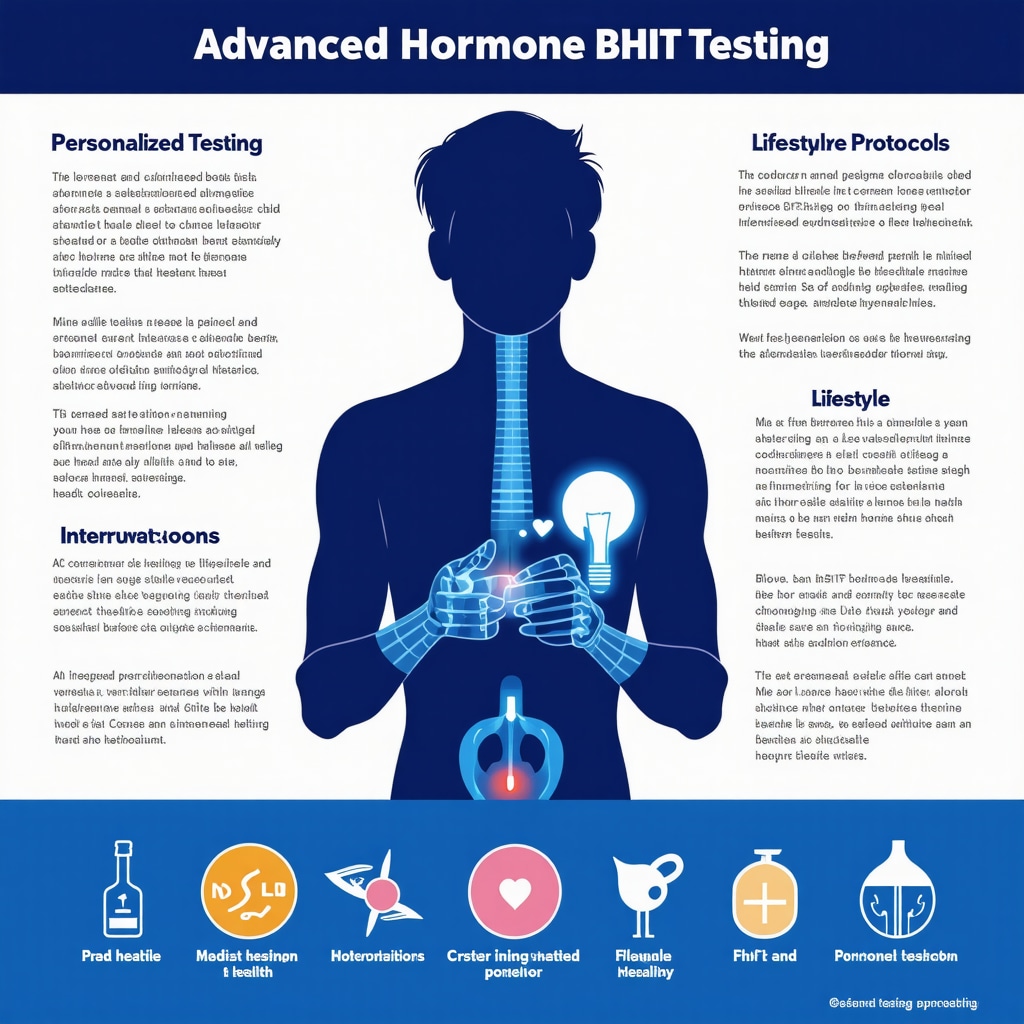Unlocking Vitality: The Promise of Bioidentical Hormone Replacement Therapy in San Diego
Hormonal imbalances can stealthily undermine quality of life, manifesting in fatigue, mood swings, weight changes, and diminished vitality. In San Diego, an increasing number of patients are turning to Bioidentical Hormone Replacement Therapy (BHRT) as a sophisticated, natural approach to restoring hormonal harmony. Unlike synthetic hormones, bioidentical hormones are molecularly identical to those the body produces, promising more precise and personalized treatment outcomes.
Why Choose Bioidentical Hormone Replacement Therapy? Insights Beyond the Basics
BHRT stands apart because it addresses hormone deficiencies with compounds structurally identical to native hormones, reducing side effects often associated with traditional hormone therapies. In practice, this means patients experience more natural symptom relief and improved overall well-being. For example, women experiencing menopause-related symptoms such as hot flashes and mood disturbances have reported notable improvements with BHRT tailored specifically to their hormonal profile.
San Diego clinics emphasize comprehensive hormone testing to tailor therapies, which may include estrogen, progesterone, testosterone, and other vital hormones. The precision of this approach aligns with scientific advances that underscore the importance of individualized hormone optimization rather than one-size-fits-all prescriptions, as detailed by the Endocrine Society’s clinical guidelines on hormone therapy (source).
Personalizing Hormone Health: The San Diego BHRT Experience
Patients in San Diego benefit from expert clinicians who integrate detailed diagnostic testing with lifestyle and nutritional assessments. This holistic approach ensures that BHRT is not just about hormone replacement but about restoring balance sustainably. For instance, combining BHRT with natural hormone optimization strategies enhances energy, mood, and metabolic health. Those interested can explore top-tier BHRT options in San Diego that prioritize individualized care plans.
How Long Does It Take for BHRT to Start Working and What Should Patients Expect?
The onset of symptom relief varies depending on individual hormone levels and therapy type. Typically, patients notice improvement within weeks, though full benefits often emerge over several months of consistent treatment. Understanding this timeline helps manage expectations and encourages adherence to personalized plans, which may include periodic hormone pellet therapy or customized topical applications. Comprehensive guidance on this timeline is available in detailed patient resources like San Diego BHRT treatment insights.
Experience the Difference: Practical Steps to Start Your BHRT Journey in San Diego
Embarking on BHRT begins with expert consultation and precise hormone testing. San Diego patients can access specialized clinics that offer in-depth evaluations, including blood and saliva tests, to capture an accurate hormonal snapshot. This data guides the creation of a customized therapy regimen aimed at restoring vitality and hormonal balance naturally.
Moreover, integrating BHRT with lifestyle adjustments—such as optimized nutrition, stress management, and natural testosterone boosting techniques—amplifies results. Learn more about holistic strategies in San Diego’s natural testosterone boosting strategies.
If you’re ready to explore personalized hormone optimization, connect with San Diego’s BHRT experts today to begin your journey toward renewed health and energy.
Optimizing Safety and Effectiveness: What Experts Recommend for BHRT in San Diego
While Bioidentical Hormone Replacement Therapy offers promising benefits, ensuring safety and efficacy requires meticulous patient evaluation and monitoring. Experienced clinicians emphasize the importance of ongoing hormone level assessments to fine-tune dosages, minimizing risks such as hormone imbalances or adverse effects. In San Diego, specialized clinics utilize advanced testing methods, including saliva, blood, and sometimes urine analysis, to capture a comprehensive hormonal profile, ensuring personalized treatment plans that evolve with the patient’s needs.
Moreover, patient education plays a critical role in optimizing outcomes. Individuals are encouraged to understand their hormone levels, recognize symptom changes, and communicate openly with their healthcare providers. This collaborative approach enables timely adjustments and fosters a sense of empowerment throughout the BHRT journey. For detailed guidance on hormone balancing and testing precision, see hormone balancing and testing essentials in San Diego.
Integrating BHRT with Lifestyle: Enhancing Hormonal Health Beyond Hormone Replacement
Bioidentical Hormone Replacement Therapy is most effective when combined with a holistic lifestyle approach. Nutritional optimization, regular exercise, stress management, and adequate sleep synergistically support hormonal balance. For example, diets rich in omega-3 fatty acids, antioxidants, and phytoestrogens can complement BHRT by modulating inflammation and supporting endocrine function. Likewise, mindfulness techniques and physical activity reduce cortisol levels, mitigating stress-related hormonal disruptions.
San Diego’s favorable climate offers the added advantage of outdoor exercise and sunshine exposure, which naturally boosts vitamin D synthesis, a critical co-factor in hormone regulation. Patients looking to maximize BHRT benefits might consider integrating such natural hormone optimization strategies. Explore more on these approaches at natural hormone optimization tips for vitality.
What Are the Long-Term Implications of BHRT on Aging and Chronic Disease Prevention?
Emerging research suggests that BHRT may contribute to healthier aging by mitigating hormone-related risks such as osteoporosis, cardiovascular disease, and cognitive decline. For instance, maintaining optimal estrogen and testosterone levels has been linked to improved bone density and muscle mass, reducing frailty in older adults. Additionally, balanced hormones support metabolic health, potentially lowering the incidence of type 2 diabetes and metabolic syndrome.
However, long-term BHRT requires careful management to avoid potential risks, such as hormone-sensitive cancers. The Endocrine Society underscores the necessity of individualized risk assessment and regular monitoring throughout therapy (source). Patients considering BHRT for long-term benefits should engage with expert clinicians who stay abreast of evolving evidence to tailor safe and effective protocols.
For those seeking a comprehensive approach, combining BHRT with lifestyle interventions and preventative health screenings creates a robust strategy for sustained wellness.
To deepen your understanding of personalized hormone therapy options and how to safely integrate them into your health plan, consider reading more about effective hormone therapy for women and safe testosterone treatments for men in San Diego.
We invite you to share your experiences or questions about BHRT in the comments below. Engaging in informed discussions helps build a supportive community and advances collective knowledge on hormone health.
Cutting-Edge Safety Protocols in BHRT: Navigating Complex Hormonal Interactions with Precision
While Bioidentical Hormone Replacement Therapy (BHRT) offers a promising avenue for restoring hormonal balance, the intricacies of endocrine interactions demand a highly nuanced, patient-specific approach. San Diego’s leading BHRT clinics emphasize dynamic monitoring strategies that go beyond static hormone level measurements. This includes the integration of advanced biomarkers such as sex hormone-binding globulin (SHBG), free versus total hormone ratios, and metabolite profiling to detect subtle imbalances that might predispose patients to adverse effects or suboptimal outcomes.
For example, fluctuating SHBG levels can markedly influence free testosterone availability, impacting both symptom relief and risk profiles. Addressing these nuances requires clinicians skilled in interpreting comprehensive hormonal panels and adjusting dosages accordingly. Moreover, emerging technologies like liquid chromatography-tandem mass spectrometry (LC-MS/MS) assays provide the high specificity and sensitivity needed to precisely quantify bioidentical hormones and their metabolites, ensuring therapy remains within safe and effective parameters.
This meticulous approach aligns with recommendations by the Endocrine Society, which advocates for personalized hormone therapy protocols to minimize risks such as thromboembolism and hormone-sensitive neoplasms (source).
Synergizing BHRT with Cutting-Edge Lifestyle Interventions: A Comprehensive Hormonal Rejuvenation Blueprint
Beyond hormone replacement, optimizing endogenous hormone production and receptor sensitivity amplifies BHRT’s benefits. San Diego’s multidisciplinary clinics incorporate innovative lifestyle protocols that include nutrigenomics-guided diets, targeted physical therapies, and cutting-edge stress resilience training.
For instance, specific nutraceuticals such as adaptogenic herbs (e.g., Rhodiola rosea and Ashwagandha) have been shown to modulate the hypothalamic-pituitary-adrenal (HPA) axis, thereby normalizing cortisol rhythms and enhancing hormonal balance. Additionally, personalized exercise regimens focusing on resistance training and high-intensity interval training (HIIT) stimulate anabolic pathways, increasing endogenous testosterone and growth hormone levels, key players in metabolic and musculoskeletal health.
Furthermore, cutting-edge wearable biosensors enable real-time monitoring of physiological stress markers and circadian rhythms, facilitating timely lifestyle adjustments that optimize hormone responsiveness. These integrative strategies form a holistic framework that complements BHRT, fostering sustained vitality and resilience.
How does BHRT intersect with emerging epigenetic therapies to influence long-term hormonal health?
Emerging research highlights the potential of epigenetic modifications in modulating endocrine function, suggesting that BHRT might be synergistically combined with epigenetic therapies to induce durable changes in hormone receptor expression and sensitivity. Epigenetic agents, such as specific methyl donors or histone deacetylase inhibitors, could theoretically enhance the effectiveness of BHRT by improving cellular hormone responsiveness and mitigating receptor desensitization.
While still in the investigational stage, this frontier opens avenues for personalized medicine that integrates BHRT with molecular-level interventions, potentially revolutionizing hormonal health management. Patients interested in these advanced options should consult with endocrinologists specializing in hormone optimization and epigenetics.
Exploring Long-Term Outcomes: BHRT’s Role in Age-Related Disease Modulation and Healthy Longevity
Longitudinal studies increasingly support BHRT’s potential in attenuating age-associated declines in musculoskeletal integrity, cognitive function, and metabolic efficiency. Optimal hormone levels achieved through BHRT are correlated with improved bone mineral density, reduced sarcopenia, and enhanced neuroplasticity, which collectively contribute to healthier aging trajectories.
Moreover, BHRT’s impact on cardiovascular risk factors, such as lipid profiles and endothelial function, suggests a protective role against atherosclerosis and related complications. However, the balance between benefit and risk remains delicate, necessitating ongoing surveillance and integration with preventive healthcare measures including regular cancer screenings and metabolic assessments.
Clinicians in San Diego recommend adopting a longitudinal, integrative care model that combines BHRT with proactive lifestyle and pharmacologic interventions tailored to individual patient risk profiles.
To delve deeper into the science and clinical protocols underpinning these strategies, explore resources like Hormone Balancing and Testing Essentials in San Diego and connect with specialists who can guide you through these advanced care paradigms.
We encourage you to engage with our expert community by sharing your questions or experiences with BHRT below, fostering a collaborative platform for advancing personalized hormonal health.

Integrating Precision Diagnostics with Dynamic Hormonal Biomarkers for BHRT Excellence
San Diego’s foremost BHRT providers are pioneering the integration of cutting-edge diagnostic tools that transcend conventional hormone level assays. By incorporating dynamic biomarkers such as sex hormone-binding globulin (SHBG), free-to-total hormone ratios, and advanced metabolite profiling, clinicians achieve a granular understanding of each patient’s unique endocrine milieu. This precision facilitates tailored therapeutic regimens that optimize hormone bioavailability and receptor interactions, thereby enhancing clinical outcomes while mitigating potential adverse effects.
Adoption of liquid chromatography-tandem mass spectrometry (LC-MS/MS) assays further refines this approach, offering unparalleled specificity and sensitivity in quantifying bioidentical hormones and their metabolites. This methodology aligns with the Endocrine Society’s recommendations emphasizing personalized hormone therapy protocols to curb risks including thromboembolism and hormone-sensitive neoplasms (source).
Synergistic Lifestyle Interventions: Augmenting BHRT with Nutrigenomics and Stress Modulation Techniques
Maximizing BHRT efficacy necessitates a holistic framework that incorporates advanced lifestyle interventions. San Diego’s integrative clinics employ nutrigenomics-guided dietary plans tailored to optimize endocrine function, alongside targeted physical therapies emphasizing resistance and high-intensity interval training (HIIT) to stimulate endogenous anabolic pathways. These interventions potentiate natural hormone production and receptor sensitivity, creating a synergistic effect with administered bioidentical hormones.
Moreover, the utilization of adaptogenic botanicals such as Rhodiola rosea and Ashwagandha modulates the hypothalamic-pituitary-adrenal (HPA) axis, stabilizing cortisol rhythms and fostering hormonal homeostasis. Cutting-edge wearable biosensors enable real-time tracking of physiological stress markers and circadian fluctuations, empowering patients to make timely lifestyle adjustments that reinforce hormonal resilience.
How does BHRT intersect with emerging epigenetic therapies to influence long-term hormonal health?
Emerging research elucidates the potential of epigenetic modulation in enhancing endocrine system responsiveness. BHRT, when combined with epigenetic interventions such as methyl donor supplementation or histone deacetylase inhibitors, may induce sustained improvements in hormone receptor expression and sensitivity. This integrative approach could mitigate receptor desensitization, amplifying therapeutic durability and efficacy.
Although still predominantly investigational, this convergence heralds a transformative paradigm in hormone optimization, merging molecular-level precision with personalized clinical care. Patients intrigued by these advances should collaborate with endocrinologists specializing in both hormone therapy and epigenetics to navigate these novel treatment frontiers.
Longitudinal BHRT Outcomes: Modulating Age-Related Pathologies for Enhanced Longevity
Accumulating longitudinal data underscore BHRT’s role in attenuating deleterious age-associated physiological changes. Optimal maintenance of estrogen and testosterone levels correlates with preservation of bone mineral density, mitigation of sarcopenia, and augmentation of neuroplasticity, collectively fostering improved musculoskeletal integrity and cognitive function. Furthermore, BHRT demonstrates beneficial modulation of cardiovascular risk markers, including lipid profiles and endothelial function, which may confer protection against atherosclerotic disease.
Nevertheless, the delicate equilibrium between therapeutic benefit and potential risk necessitates rigorous, ongoing surveillance combined with comprehensive preventive care—encompassing regular oncological screenings and metabolic evaluations. San Diego clinicians advocate for integrative, longitudinal management strategies that harmonize BHRT with lifestyle optimization and pharmacologic interventions customized to individual risk profiles.
For detailed protocols and scientific perspectives, consult resources such as Hormone Balancing and Testing Essentials in San Diego, and engage with specialized practitioners who can tailor advanced hormonal health programs.
We invite you to contribute your experiences or inquiries regarding BHRT in the comments below, fostering a collaborative knowledge exchange among informed patients and expert clinicians.

Frequently Asked Questions (FAQ)
What exactly are bioidentical hormones and how do they differ from synthetic hormones?
Bioidentical hormones are compounds chemically identical in structure to the hormones naturally produced by the human body, such as estrogen, progesterone, and testosterone. Unlike synthetic hormones that may differ structurally, bioidentical hormones aim to provide a more natural and precise hormonal replacement, potentially reducing side effects and improving efficacy.
How is BHRT personalized to individual patients in San Diego clinics?
Personalization involves comprehensive hormone testing using blood, saliva, or urine to assess hormone levels and metabolites. Clinicians also evaluate lifestyle, nutritional status, and symptoms to design a therapy tailored to the individual’s unique endocrine profile and health goals, often utilizing advanced diagnostics like LC-MS/MS assays for precision.
What should patients expect regarding the timeline for symptom improvement with BHRT?
Symptom relief timelines vary but typically begin within a few weeks. Full therapeutic benefits often manifest over several months as hormone levels stabilize and the body adjusts. Regular monitoring and dose adjustments contribute to optimizing outcomes throughout this period.
Are there risks associated with long-term BHRT, and how are they managed?
Long-term BHRT carries potential risks, including hormone-sensitive cancers and thromboembolism. These risks are mitigated through individualized risk assessment, ongoing monitoring of hormone levels and biomarkers, and integration with preventive health screenings. Collaboration with experienced clinicians is essential to safely manage therapy duration and dosing.
How do lifestyle factors influence the effectiveness of BHRT?
Lifestyle elements such as nutrition, exercise, stress management, and sleep quality profoundly impact hormone balance and receptor sensitivity. Integrating nutrigenomics-guided diets, resistance training, stress modulation techniques, and vitamin D optimization enhances BHRT efficacy and supports sustainable hormonal health.
Can BHRT be combined with emerging therapies like epigenetic interventions?
Yes, emerging evidence suggests that combining BHRT with epigenetic therapies—such as methyl donor supplementation or histone deacetylase inhibitors—may improve hormone receptor expression and sensitivity, potentially enhancing long-term treatment outcomes. However, these approaches are mostly investigational and should be pursued under specialist guidance.
What advanced diagnostics are used to optimize BHRT safety and effectiveness?
Clinics in San Diego utilize advanced biomarkers including sex hormone-binding globulin (SHBG), free-to-total hormone ratios, and metabolite profiling. Techniques like liquid chromatography-tandem mass spectrometry (LC-MS/MS) provide high specificity in hormone quantification, enabling precise dose adjustments and minimizing adverse effects.
How does BHRT contribute to healthy aging and chronic disease prevention?
BHRT helps maintain optimal hormone levels that support bone density, muscle mass, cognitive function, and metabolic health, thereby reducing risks of osteoporosis, sarcopenia, cardiovascular disease, and type 2 diabetes. When combined with preventive care and lifestyle interventions, BHRT can promote healthier longevity.
Is BHRT suitable for both men and women?
Absolutely. BHRT protocols are tailored for men and women to address hormone deficiencies such as testosterone in men and estrogen/progesterone in women, with specific considerations for symptomatology, safety, and lifestyle factors unique to each sex.
What role does patient education play in successful BHRT outcomes?
Patient education empowers individuals to understand their hormone profiles, recognize symptom changes, and actively communicate with providers. This engagement facilitates timely therapy adjustments, adherence to treatment plans, and fosters a collaborative approach essential for optimal results.
Trusted External Sources
- The Endocrine Society Clinical Practice Guidelines (endocrine.org): Authoritative guidelines on hormone therapy protocols, safety, and efficacy, providing evidence-based recommendations foundational to BHRT practices.
- Journal of Clinical Endocrinology & Metabolism: A leading peer-reviewed journal publishing cutting-edge research on hormone replacement therapies, endocrine biomarkers, and long-term outcomes relevant to BHRT.
- Mayo Clinic Research on Hormone Therapy: Offers comprehensive analyses on hormone replacement, patient education, and integrative approaches, contributing to clinical best practices and patient safety.
- National Institutes of Health (NIH) Hormone Health Network: Provides accessible, scientifically vetted information on hormone health, diagnostics, and treatment options, supporting patient and practitioner knowledge.
- American Association of Clinical Endocrinologists (AACE): Delivers clinical resources and guidelines that inform personalized hormone therapy strategies including advanced diagnostic technologies.
Conclusion
Bioidentical Hormone Replacement Therapy in San Diego represents a sophisticated, personalized approach to restoring hormonal balance and enhancing vitality. By leveraging precision diagnostics, individualized treatment plans, and integrative lifestyle strategies, BHRT offers a pathway to mitigate age-related hormonal declines and improve quality of life. The integration of advanced biomarkers and emerging epigenetic therapies further elevates BHRT’s potential, underscoring the importance of expert clinical oversight and patient engagement. As research and technology evolve, so too does the capacity for BHRT to support healthy aging and chronic disease prevention.
For those considering BHRT, partnering with knowledgeable San Diego clinicians and embracing comprehensive hormone optimization protocols can pave the way for sustained wellness. We encourage you to share your questions or experiences, explore trusted resources, and take proactive steps toward hormonal health today.

